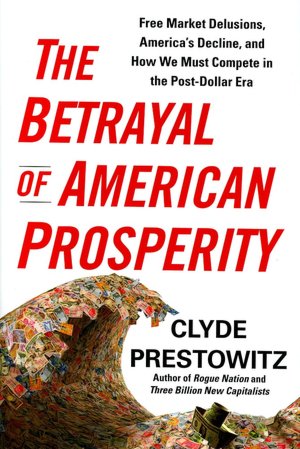Clyde Prestowitz’s neo-mercantilism could be telling us something about the revival of manufacturing in Canada too
Apr 14th, 2012 | By Counterweights Editors | Category: In Brief
Clyde V. Prestowitz Jr., BA, MA, MBA, former counselor to the Secretary of Commerce in the Reagan Administration, founder and president of the Economic Strategy Institute, senior businessman and government policy advisor, author of many articles and several books. Mr. Prestowitz is also “fluent in Japanese, Dutch, German, and French.”
Watching Ronald Reagan’s former budget director David Stockman on Bill Maher’s excellent US TV show last night reminded some of us that Clyde Prestowitz, another former Reagan Administration apparatchik (counselor to the Secretary of Commerce), has also been saying some remarkably sensible and even “progressive” things about economic policy lately.
The latest Prestowitz literary soundbite we’ve bumped into is his 800-word meditation about “The American decline debate,” on the Foreign Policy magazine website this past Thursday. Here is a 235-word precis of what we at least see as the main argument (and strictly, we’d add, in Clyde Prestowitz”s own words) :
“What looked like high US growth in the late 1990s and between 2002 and 2008, was actually two highly destructive bubbles from which we are still recovering … Except for the top one percent of the income distribution, Americans today have not seen much of an increase in real income since 1975. You’d have to be blind not to see the deterioration of our infra-structure. We used to have trade surpluses. Now we have chronic deficits … We used to be the world’s biggest creditor. Now we are its biggest debtor. The dollar used to buy 360 yen and 4 German Marks. Now it buys only 80 yen and about .7 euros. How can anybody claim we’re not suffering decline? …
 “But the fact of decline is not the main issue. The real question is whether the evident decline is inevitable, stoppable, or reversible. Here I am much more positive. I say reversible … So what needs to be done. Nothing too complicated really. Just watch Singapore, China, Germany, and Brazil and do what they do. Do they offer substantial financial incentives to induce off-shoring of production to their shores? Fine. Study their programs and copy them. Do they target key industries for development? Fine, do the same. Do they coordinate closely between government, labor, and management. Great. Do the same … Anything they can do we should be able to do as well, sometimes maybe even better.”
“But the fact of decline is not the main issue. The real question is whether the evident decline is inevitable, stoppable, or reversible. Here I am much more positive. I say reversible … So what needs to be done. Nothing too complicated really. Just watch Singapore, China, Germany, and Brazil and do what they do. Do they offer substantial financial incentives to induce off-shoring of production to their shores? Fine. Study their programs and copy them. Do they target key industries for development? Fine, do the same. Do they coordinate closely between government, labor, and management. Great. Do the same … Anything they can do we should be able to do as well, sometimes maybe even better.”
Another such piece of Prestowitzian wisdom from this past February (also on the Foreign Policy magazine web site) summarized the general theory behind his current economic policy prescriptions: “The global economy is, in fact, sharply divided between those who are playing the free trade game and those who are playing some form of mercantilism. Of course, there is a spectrum of attitudes and policies, but roughly speaking the Anglo/American countries, North America, and parts of Europe are playing free trade. Most of Asia, much of South America, the Middle East, Germany and parts of Europe are playing neo-mercantilism. It’s like watching tennis players trying to play a game with football players. It doesn’t work … We first need to get everyone playing the same game, and that is more likely to turn out to be football than tennis.”
 Along with many other things, we think there is much food for thought here for those who are supposed to be worried about reviving the Canadian manufacturing sector. Like others in “ the Anglo/American countries, North America, and parts of Europe,” the Harper government in Ottawa is still trying to play tennis. And when the likes of Dalton McGuinty and Thomas Mulcair try to talk about changing the game to football, they just get pilloried as “socialists” and all that. At some point, hopefully, those ideologically obsessed admirers of the 19th century still suffering from “Free Market Delusions” are going to have to wake up. Clyde Prestowitz and David Stockman and so forth are NOT socialists of any description. They used to work for the Reagan Administration. They are just very smart economic policy thinkers with strong track records, and they’re just trying to tell it like it really is in the early 21st century.
Along with many other things, we think there is much food for thought here for those who are supposed to be worried about reviving the Canadian manufacturing sector. Like others in “ the Anglo/American countries, North America, and parts of Europe,” the Harper government in Ottawa is still trying to play tennis. And when the likes of Dalton McGuinty and Thomas Mulcair try to talk about changing the game to football, they just get pilloried as “socialists” and all that. At some point, hopefully, those ideologically obsessed admirers of the 19th century still suffering from “Free Market Delusions” are going to have to wake up. Clyde Prestowitz and David Stockman and so forth are NOT socialists of any description. They used to work for the Reagan Administration. They are just very smart economic policy thinkers with strong track records, and they’re just trying to tell it like it really is in the early 21st century.

